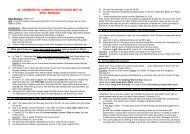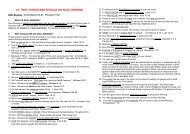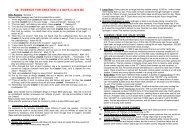117. JEHOVAH'S WITNESSES, the TRINITY and THE ... - Answers
117. JEHOVAH'S WITNESSES, the TRINITY and THE ... - Answers
117. JEHOVAH'S WITNESSES, the TRINITY and THE ... - Answers
You also want an ePaper? Increase the reach of your titles
YUMPU automatically turns print PDFs into web optimized ePapers that Google loves.
Ask: (2) Didn’t <strong>the</strong> Jews already have unity of purpose with <strong>the</strong> Fa<strong>the</strong>r?<br />
Ask: (3) If Jesus was just stating His unity of purpose with <strong>the</strong> Fa<strong>the</strong>r, <strong>the</strong>n why did <strong>the</strong><br />
Jews underst<strong>and</strong> His words to claim that He was God? (v.33).<br />
Ask: (4) If (as <strong>the</strong> WT says), <strong>the</strong> Jews were mistaken in thinking Christ to be God,<br />
why didn’t Jesus correct <strong>the</strong>ir misunderst<strong>and</strong>ing? Instead, Jesus endorsed <strong>the</strong>ir underst<strong>and</strong>ing<br />
(v.34-38), as seen by <strong>the</strong>m seeking to take Him again in v.39.<br />
The John 17:21 context is very different, as <strong>the</strong> Greek word for ‘one’ (en) refers to unity<br />
among people tending to be divisive over various issues. That is why Christ prayed for unity<br />
among believers.<br />
The way <strong>the</strong> word ‘one’ is used in John 17:21 does not determine its meaning in John 10:30.<br />
Ask: (5) If <strong>the</strong> oneness that Christ shares with <strong>the</strong> Fa<strong>the</strong>r is identical to <strong>the</strong><br />
oneness that believers have with Christ, <strong>the</strong>n all believers should be able to insert <strong>the</strong>ir<br />
names in <strong>the</strong>se verses:<br />
- ‘I (your name) <strong>and</strong> <strong>the</strong> Fa<strong>the</strong>r are one.’ (John 10:30, NWT)<br />
- ‘He who does not honour (your name) does not honour <strong>the</strong> Fa<strong>the</strong>r who sent him.’John 5:23<br />
- ‘All things that <strong>the</strong> Fa<strong>the</strong>r hath are Mine (your name).’ (John 16:15).<br />
Ask: (6) Are you willing to insert your name in <strong>the</strong>se verses? Obviously not!<br />
16. John 10:33 ‘thou being a man, makest thyself God’.<br />
In John 10:33, John records <strong>and</strong> endorses <strong>the</strong> Jews’ accusation that Jesus is claiming to be<br />
God: ‘For a good work we stone <strong>the</strong>e not; but for blasphemy; <strong>and</strong> because that thou, being a<br />
man, makest thyself GOD’. v.33.<br />
‘Jesus answered <strong>the</strong>m, Is it not written in your law, I said, Ye are gods?’ v.34.<br />
Watchtower Teaching: To this, JWs reply that Jesus was denying being God, claiming to<br />
be no more God than <strong>the</strong> Jews.<br />
Bible Teaching:<br />
v.34 ‘Jesus answered <strong>the</strong>m, Is it not written in your law (Old Testament law in Psalm<br />
82:1,6,7), I said, ye are gods? (Hebrew ‘gods’= elohim 430 ).<br />
v.35 ‘If he called <strong>the</strong>m (Old Testament Jewish judges or magistrates) gods unto whom <strong>the</strong><br />
word of God came (Jewish magistrates were entrusted with judging justly).<br />
v.36 ‘Say ye (Jesus’ listeners) of him (Christ), whom <strong>the</strong> Fa<strong>the</strong>r hath sanctified, <strong>and</strong> sent into<br />
<strong>the</strong> world, ‘Thou (Jesus) blasphemest’; because I said, I am <strong>the</strong> Son of God?’<br />
v.39 Therefore <strong>the</strong>y sought again to take him . . .’.<br />
Jesus’ words, ra<strong>the</strong>r than denying His deity, still left <strong>the</strong> Jews underst<strong>and</strong>ing that He was<br />
claiming full deity <strong>and</strong> equality with God because <strong>the</strong>y still sought to arrest him for<br />
blasphemy. (v.31-33, <strong>and</strong> 39).<br />
Explanation: Jesus in v 34 is quoting from Psalm 82:1-6 which says:<br />
v.1 ‘God st<strong>and</strong>eth in <strong>the</strong> congregation of <strong>the</strong> mighty; he judgeth among <strong>the</strong> gods (Hebrew<br />
Elohim 430 )<br />
v.2 ‘How long will ye judge unjustly . . .?’<br />
v.6 I have said, Ye are gods 430 <strong>and</strong> all of you are children of <strong>the</strong> most High’.<br />
v.7 ‘But ye shall die like men . . .’<br />
‘Ye are gods’ is said of magistrates, because of <strong>the</strong> dignity <strong>and</strong> honour of <strong>the</strong>ir office. It<br />
shows that <strong>the</strong> word translated ‘gods’ (Elohim) can rightly be applied to men, though rare.<br />
It applied to Moses (Exodus 7:1; 4:16) <strong>and</strong> to magistrates (Exodus 21:6; 22:8,9) because <strong>the</strong>y<br />
were representing God. The meaning is:<br />
If <strong>the</strong> Scripture applies <strong>the</strong> word ‘god’ to earthly magistrates, it is right to apply <strong>the</strong> term<br />
to those in office <strong>and</strong> authority. If applied to magistrates, it cannot <strong>the</strong>refore be<br />
blasphemy to use this word of Jesus Christ <strong>the</strong> Messiah who is so much more exalted<br />
<strong>and</strong> sanctified by <strong>the</strong> Fa<strong>the</strong>r than earthly magistrates.<br />
Note: 1) Jesus did not deny that he meant to apply <strong>the</strong> term to himself, as seen by His using<br />
<strong>the</strong> expressions ‘I <strong>and</strong> my Fa<strong>the</strong>r are one’ v.30; ‘Son of God v.36, <strong>and</strong> ‘god’ v.34.<br />
2) Jesus did not deny that it was properly applied to himself.<br />
3) Jesus did not deny that it implied that he was God.<br />
Key: Jesus stated only that <strong>the</strong>y were inconsistent in applying Elohim (god) to human<br />
magistrates <strong>and</strong> not allowing it also to be applied to Jesus Christ as Messiah.<br />
Hence, Jesus said that <strong>the</strong> Jews were not authorised to charge him with blasphemy for<br />
applying ‘god’ to himself, because <strong>the</strong> law applied Elohim (gods) to human judges <strong>and</strong><br />
because God endorsed Jesus as ‘Son of God’ by His miracles.<br />
17. John 17:5 Christ <strong>and</strong> Fa<strong>the</strong>r share <strong>the</strong> same glory, that Jehovah won’t give to ano<strong>the</strong>r.<br />
In John 17:5 Jesus said that before <strong>the</strong> world existed, He had <strong>the</strong> same glory as <strong>the</strong> Fa<strong>the</strong>r:<br />
‘And now, O Fa<strong>the</strong>r, glorify thou me with thine own self with <strong>the</strong> glory which I had with<br />
<strong>the</strong>e before <strong>the</strong> world was.’ (John 17:5).<br />
Comparing this with Isaiah 42:8 we see that Jehovah will not give his glory to ano<strong>the</strong>r:<br />
‘I am <strong>the</strong> LORD (Jehovah): that is my name: <strong>and</strong> my glory will I not give to ano<strong>the</strong>r’.<br />
Conclusion: Because Jesus shared <strong>the</strong> same glory with <strong>the</strong> Fa<strong>the</strong>r, <strong>and</strong> because this glory is<br />
exclusively Jehovah’s <strong>and</strong> no one else’s, <strong>the</strong>n this proves that Jesus Christ is Jehovah God.<br />
18. John 20:28 ‘Thomas answered <strong>and</strong> said unto him, “My Lord <strong>and</strong> my God”.’<br />
Thomas addresses Jesus as ‘My Lord <strong>and</strong> my God’, thus recognizing Jesus as Jehovah God<br />
<strong>the</strong> Son. Jesus commended Thomas on his belated acknowledgement of Jesus as God.<br />
Watchtower Teaching: JWs dismiss this verse as a simple record of Thomas’ shock <strong>and</strong><br />
surprise at seeing <strong>the</strong> risen Christ. A modern parallel might be ‘Oh, my God!’<br />
Perhaps Thomas was making an emotional exclamation that was directed to Jehovah God,<br />
though spoken to Jesus. (Should you Believe in Trinity, p.29).<br />
Bible Teaching:<br />
a) If Thomas said, ‘My Lord <strong>and</strong> my God’ as expressing shock or surprise, <strong>the</strong>n he would<br />
have been guilty of blasphemy, <strong>and</strong> of taking God’s name in vain.<br />
First century Jews regarded any careless use of God’s name as blasphemy.<br />
b) If Thomas had taken God’s Name in vain, Jesus clearly would have rebuked him for it.<br />
c) Instead, Jesus commended Thomas for believing that Jesus was both Lord <strong>and</strong> God.<br />
(‘Thomas, because thou hast seen me thou hast believed’ v.29).<br />
If Jesus was only a man or a god, He should have corrected Thomas’ wrong opinion, but<br />
Jesus reinforced Thomas’ view here.<br />
d) Thomas wasn’t calling Jesus ‘a god’; he was calling Jesus his Lord <strong>and</strong> his God. If Jesus<br />
was not Almighty God, He would have corrected Thomas by saying something like,<br />
‘No, I am just a god, a lesser god. Jehovah is <strong>the</strong> only true God. You must not put me in<br />
Jehovah’s place. Only Jehovah may be called my Lord <strong>and</strong> my God.’ But Jesus said no<br />
such nonsense. He commended Thomas for recognizing Him as <strong>the</strong> true God.<br />
If Thomas said ‘My Lord <strong>and</strong> my God’ as an emotional exclamation of astonishment, as<br />
JWs think, <strong>the</strong>n Thomas would be talking to himself.<br />
But v.28 states he was talking to Jesus by using <strong>the</strong> word ‘him’.





